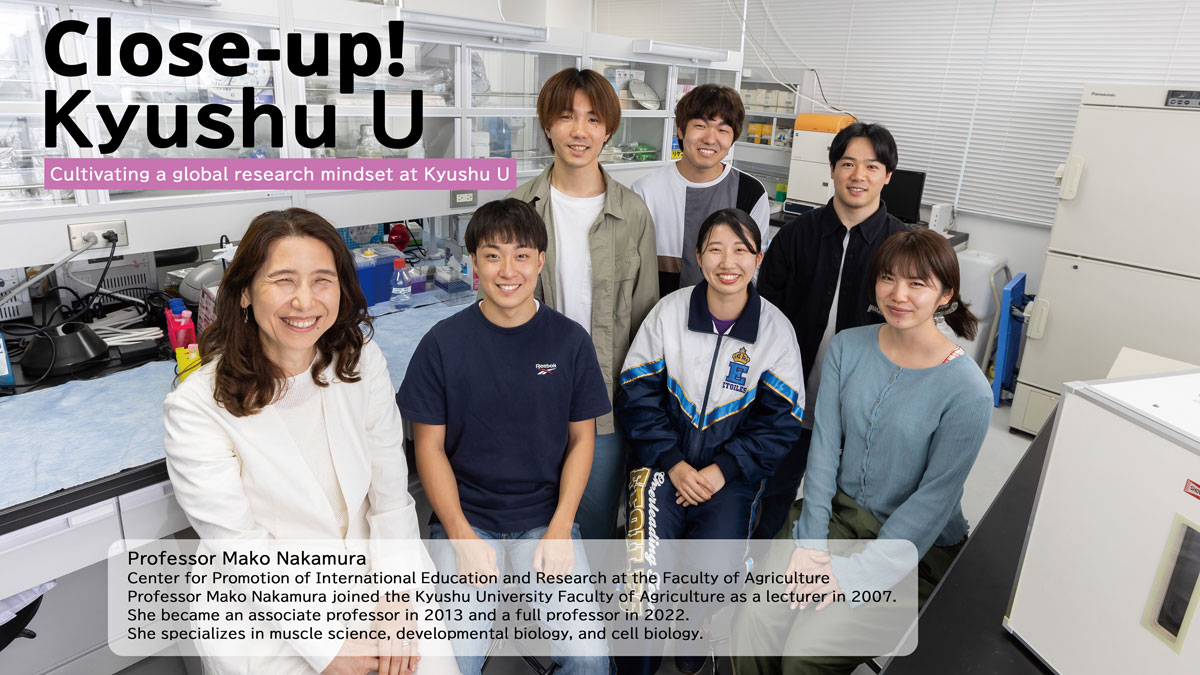
Generating integrative knowledge and training future researchers
in Kyushu University's advanced education and research environment
Kyushu University has set up special initiatives to educate talented, diverse researchers who will lead academic research into the future. For this interview, we spoke to Professor Mako Nakamura of the Faculty of Agriculture, who participates in these efforts as a researcher and is also dedicated to fostering young research talent.
*The interview was held in May 2023. Grades and other information are current as of the time of the interview.
The original Japanese version of the interview can be found here.

Delivering quality education and research to raise high school students’ aspirations
The Ministry of Education, Culture, Sports, Science and Technology (MEXT) is promoting a policy to increase the touchpoints between high schools and universities and thereby enhance educational continuity.
Toward this end, Kyushu University has created the Kyushu University Future Creators in Science Project (QFC-SP) to give high school students the chance to experience classes and research at the university level. Utilizing university research facilities, each student in the program becomes a member of a research lab and can work on experiments or practical exercises, pursuing individual research activities on specific research topics. With so many qualified students applying for the popular program, deciding which students to select is incredibly difficult. Nakamura, an academic advisor of the program, says, “High school students study very hard, certain that many fun and interesting things await them at university. We want to provide an education and research experience that raises their aspirations.”

Last Chance: Applying to SENTAN-Q amid career uncertainty
Kyushu University also emphasizes career development, aimed at attracting and training diverse personnel and generating integrative knowledge.
The SENTAN-Q program, whose official name is “Diversity and Super Global Training Program for Female and Young Faculty,” is designed to discover and train talent among women and young people with the potential to be leaders in global research. Successful trainees who reach the targeted learning level are promoted internally within one year of completing the program. Nakamura was among the first class of trainees.
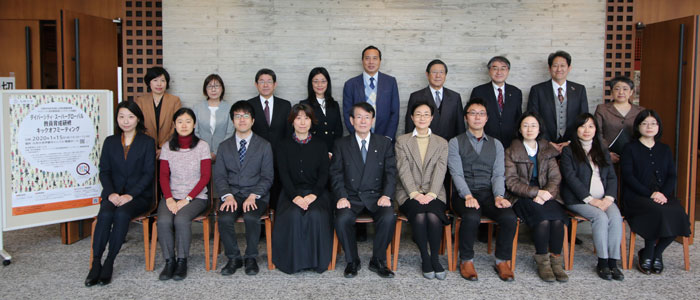
After finishing her graduate studies, Nakamura spent five years at a research institution in the United States before taking a position at the Faculty of Agriculture in 2007. Her participation in SENTAN-Q came only after building career experience. We asked about the thought process behind her decision.
“At the time, I was having second thoughts about my career. My classmates from graduate school were being promoted to professorships, and I thought that if given the chance to become a professor, I should take it. That’s when I found out about the call for applicants to SENTAN-Q, so I applied, considering it my last chance.”
During the training, she felt like she was back in elementary school. “When I was a little girl, I was very competitive. I hated to lose and always wanted to be the best at everything. I felt just like that again during the program. I didn’t hold back for anyone, and I worked really hard for recognition. Last year, I was promoted to professor, affording me more opportunities to participate in decision-making, which has been rewarding. The content of the SENTAN-Q training is very useful to me now."

Never relent, always deliver—a research mantra to live by
Nakamura uses fertile eggs in her research to clarify the processes and mechanisms by which the body of a chicken takes shape. She focuses particularly on smooth muscle and skeletal muscle cells.
In 2021, she began new research using poultry as an experimental model for meat production and established the Animal Life Science Lab at the Graduate School of Bioresource and Bioenvironmental Sciences.

Nakamura also belongs to the Center for Promotion of International Education and Research at the Faculty of Agriculture. In her role, she supports students who wish to study abroad or take internships and also encourages their participation in international collaborative research.
Saki Egashira, a member of Nakamura’s lab, plans to participate in an exchange program at the University of Georgia in the U.S. this year from August to December. “On the program, I’ll learn genetic analysis techniques and study livestock meat quality with researchers who are working collaboratively with Professor Nakamura. Working in the lab with people from completely different backgrounds will also help me hone my communication skills,” she says.
Mutsuki Nakagomi, the first student to join Nakamura’s lab, is scheduled to give a presentation at a conference of the British Ornithologists’ Union in the U.K. this September. Regarding this opportunity, he says, “This will be the first in-person conference I have attended since the pandemic, and I’m nervous because it’s an international conference at that. I plan to prepare well, and I’m sure I will learn something to take home with me. Despite the challenges of working in a new lab, thanks to Professor Nakamura’s supervision, I have still been able to carry out my research productively.”
Nakamura instructs her students to “never relent and always deliver.” In her own words, “I want them to put all they’ve got into doing research, but when you focus too much on one thing and it doesn’t go as expected, it can feel like things are falling apart. But if you join a university club, get a part-time job, or have some kind of support network, that can get you through the tough times. If things are going well outside of your research, that will naturally provide more motivation for the work. I want my students to pursue their interests on or off campus, whatever they may be.”

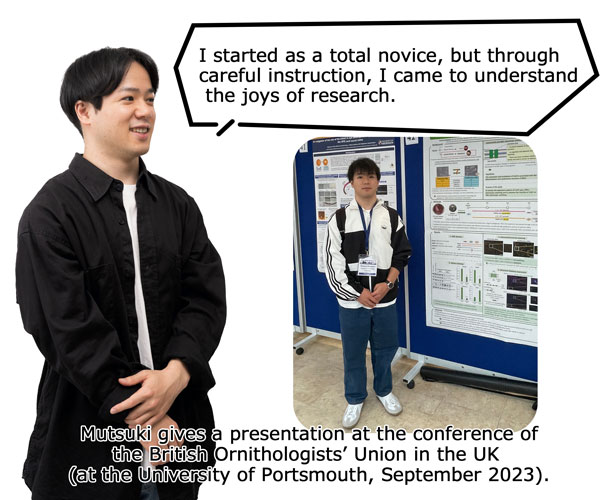
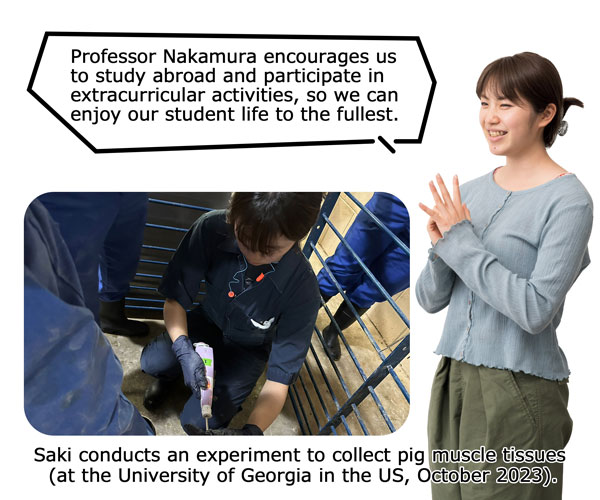
LEARN MORE
High School/University Articulation Reforms
These initiatives are aimed at creating an educational system able to assess diverse academic skills and other abilities by more closely linking high school and university education. Such reforms are expected to help students acquire knowledge and skills that will be useful in university research and in their future.
Diversity and Super Global Training Program for Female and Young Faculty (SENTAN-Q)
This program provides opportunities for female and young faculty members with notable research achievements to take on the challenges of world-class research and education. The objective is to use a practical approach to develop top-level research and educational skills.
Kyushu University Future Creators in Science Project (QFC-SP)
QFC-SP is designed to foster the next generation of science and technology professionals. Aimed at high school students, it seeks to develop their advanced problem-solving skills by providing high-level practical education at Kyushu University throughout the year.
Special dialogue on QFC-SP
“I discovered what I wanted to do after participating in QFC-SP!”
Kyushu University Future Creators in Science Project (QFC-SP) aims to nurture the next generation of science and technology professionals among high school students. We spoke to Yuu Nakaseko, a freshman in the School of Interdisciplinary Science and Innovation and a QFC-SP alumnus of Nakamura’s lab.
Participating in an international symposium and gaining inspiration from her peers
- Yuu, please tell us why you participated in QFC-SP.
Yuu: I was on the humanities track, so I didn't have much to do with science. But then, my high school teacher recommended QFC-SP and gave me a brochure that featured Professor Nakamura’s research. I was intrigued by her approach to solving the issue of food shortages through muscle cell research, and I really wanted to learn more, so I decided to participate.
- How was the program?
Yuu: Although the pandemic made it frustrating at times, it gave me the chance to give a poster presentation at an international symposium for high school students. It was very inspiring and valuable to meet other students my age conducting research in various fields.
Mako: Yuu put a lot of effort into her interim presentation, which was the first big hurdle in the research course. Unfortunately, her evaluation wasn’t as favorable as she had hoped, and she felt quite down. She came to me for advice on how she could make her final presentation better in six months’ time. I told her to think about what she hoped to get out of QFC-SP and how she wanted to spend the remaining six months. She told me that she wanted to work hard on her experiments in that remaining time and get results, then enter the School of Interdisciplinary Science and Innovation at Kyushu University. I was overjoyed that she had such a clear vision.
Join if you’re eager to research, whatever your field!
- Yuu, after participating in the QFC-SP, did you feel any change in your mindset?
Yuu: If I hadn’t participated in the project, I might never have wanted to study at the School of Interdisciplinary Science and Innovation. While doing my research, I thought lab-grown meat would be the cure-all for food shortages, but I learned of its shortcomings at the International Symposium for High School Students. For cultured meat to become popular, it is more than a matter of having the technology to produce it. Other hurdles also need to be overcome, including consumer psychology, the development of regulations, and creating the right market balance that includes livestock producers. It got me thinking that joining the School of Interdisciplinary Science and Innovation would enable me to tackle the global issue of meat shortages by drawing on insights from a variety of fields.
Mako: I agree that research on cultured meat requires knowledge of social sciences, but it’s outside my field of expertise. I believe that Yuu is a good candidate as a future collaborative researcher who can develop “integrative knowledge” by blending information from different fields.
Yuu: It’s very reassuring to have the support of Professor Nakamura, who tells me that she will support whatever path I choose to follow. I would heartily recommend participating in QFC-SP to all high school students. It doesn’t matter if you’re a humanities or science person, as long as there’s something you really want to research. It may very well help you find out what you want to do in the future.
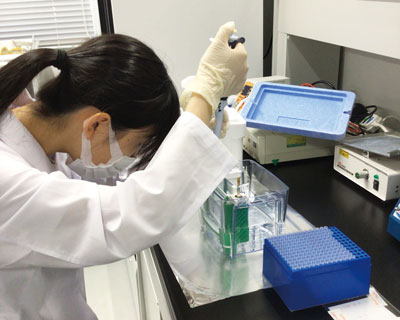
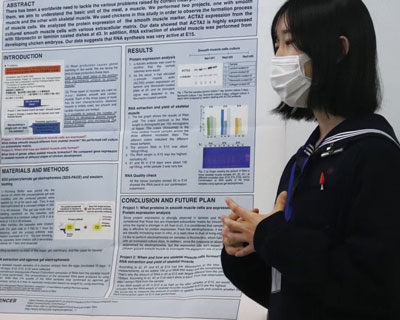
Yuu Nakaseko
A first-year student at the School of Interdisciplinary Science and Innovation, she participated in the QFC-SP from July 2020 to March 2022, attending a year-and-a-half-long program that began with an introductory primary course and continued with a research course.


Yuu Nakaseko
A first-year student at the School of Interdisciplinary Science and Innovation, she participated in the QFC-SP from July 2020 to March 2022, attending a year-and-a-half-long program that began with an introductory primary course and continued with a research course.































